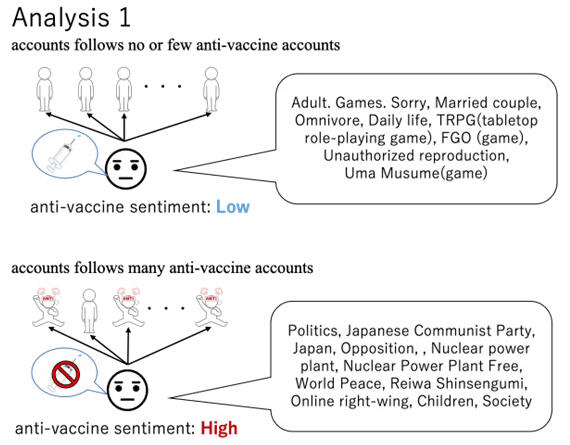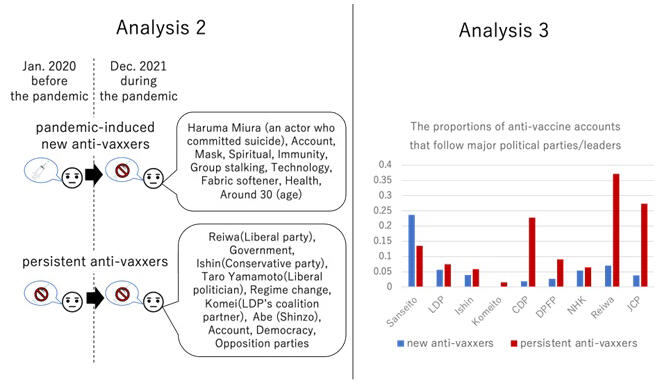A research group consisting of Professor Fujio Toriumi of the School of Engineering and Visiting Researcher Takeshi Sakaki of the Institute for Future Initiatives at the University of Tokyo, Professor Tetsuro Kobayashi of the School of Political Science and Economics at Waseda University and Associate Professor Mitsuo Yoshida of the Institute of Business Sciences at the University of Tsukuba used machine learning to analyze a large number of tweets about vaccines during the COVID-19 pandemic. Their analysis revealed the characteristics of newly transitioned anti-vaxxer users. The results were based on an analysis of approximately one hundred million tweets containing the word "vaccine" collected in 2021. The findings are expected to contribute to the prevention of the propagation of anti-vaccine attitudes that could be a threat to public health. The results were published in the Journal of Computational Social Science, an international academic journal, on February 5, 2024.

Provided by the University of Tokyo
Approximately one hundred million tweets containing the word "vaccine" were retrieved between January and December 2021. Through machine learning, three clusters were extracted: "pro-vaccine tweets," "tweets criticizing vaccine policy," and "anti-vaccine tweets." Accounts that posted or retweeted "anti-vaccine tweets" were identified and defined as "anti-vaccine information spreading accounts." Users who followed many "anti-vaccine information spreading accounts" were defined as "anti-vaxxers."
The first analysis compared pro- and anti-vaxxers to identify the characteristics of anti-vaxxers. The second analysis compared pre- and post-COVID-19 anti-vaxxer users to identify the "triggers" that caused the transition by assessing the characteristics of users who newly developed anti-vaccine attitudes. In the third analysis, the political characteristics of users who newly became anti-vaxxers were identified through the number of accounts of political parties or their leaders they follow.
The results revealed that, compared to pro-vaxxers, anti-vaxxers in Japan had higher political interests and were more likely to be liberals than right wingers. As for pro-vaxxers, even though they posted or retweeted about vaccines, they mainly presented a high level of interest in personal concerns, such as games and anime, and low interest in politics.
Pre-COVID-19 anti-vaxxers had an especially high level of interest in politics, whereas post-COVID-19 anti-vaxxers had less political inclination. Moreover, words related to conspiracy theories and spirituality appeared frequently in the Twitter profiles of post-COVID-19 anti-vaxxer users.
Pre-COVID-19 anti-vaxxer users were more likely to follow accounts of the Constitutional Democratic Party of Japan, Reiwa Shinsengumi Party, and the Japanese Communist Party. Post-COVID-19 anti-vaxxer users were more likely to follow Sanseito Party (Party of Do It Yourself), as demonstrated by a sharp increase in the number of followers from March to September 2022, which suggested that their anti-vaccine attitudes may have been triggered by conspiracy theories and spirituality. These attitudes of post-COVID-19 anti-vaxxer users may have contributed to a rise in support for the anti-vaccine Sanseito Party.
The results indicated that, although conspiracy theories and spirituality may not have direct political implications, they may trigger anti-vaccine attitudes among some individuals.

Provided by the University of Tokyo
According to Toriumi, "Although many previous studies had surveyed individuals who were skeptical about vaccines, only a few studies have examined how some individuals became anti-vaxxers. Because of this, I believe our study is meaningful. Since Twitter, the data source of our analysis, changed to X, it became more expensive to obtain data. This may pose a difficult problem in future social analysis using social media."
Journal Information
Publication: Journal of Computational Social Science
Title: Anti-vaccine rabbit hole leads to political representation: the case of Twitter in Japan
DOI: 10.1007/s42001-023-00241-8
This article has been translated by JST with permission from The Science News Ltd. (https://sci-news.co.jp/). Unauthorized reproduction of the article and photographs is prohibited.




